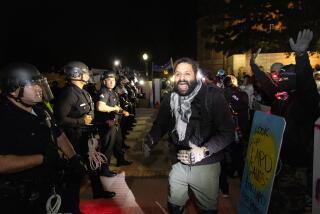Campus-Speak : The Thirst for Knowledge Is Not the Inspiration for College Slang
- Share via
EVERYONE KNOWS that teen-agers speak a sublanguage of their own. Fewer of us are aware, I suspect, that college students similarly develop a slang that becomes the common language of campus and dormitory life.
The two languages do not necessarily serve the same purpose: Teen slang makes teen conversation unintelligible to adults and thus preserves the teen group’s privacy. College students are not so threatened by the immediate presence of their parents, so we must assume that the purpose of their slang is to improve and invigorate the language.
Pamela Munro, professor of linguistics at UCLA, has sent me a book, “UCLA Slang: A Dictionary of Slang Words and Expressions Used at UCLA,” which was compiled by a dedicated class she taught. (It is for sale for $5 at the UCLA Book Store.)
Glancing through it, I infer that slang is indispensable to campus life and reflects its nature: There are more expressions for drunkenness, throwing up and sex than for any other activities.
That does not mean, I suspect, that college youths are more given to strong drink than the general population,-- though they may be, and being less experienced, they may be more likely to throw up. There are more synonyms for drunk in the English language than for any other.
Among the printable words for drunk , for example, are blasted , blitzed , bombed , ripped , shredded , slaughtered , blown and blotto . You will notice that some of them--like bombed and blotto--are in the general language and have been for a long time.
There is a plethora of demeaning epithets: animal , a wild, crazy person; airhead , a dumbbell; beddy , a promiscuous woman; bub , a person with no redeeming qualities; Chester Molester , a lecherous man; scary , unattractive, repulsive. Also newt , nerd , kook and dweeb , most of which are in the general language and define an inept, stupid wimp.
There is no shortage of words meaning to have sex . A few of the printable ones: boink , bump , jock, jump and romp . Whether those represent a high incidence of sex on campus or merely a high incidence of thinking about it, we can only imagine. They do seem to reflect macho male attitudes toward the practice.
A curious phenomenon in the dictionary is the incidence of formal, rather out-of-date words that have been revived in their original sense. For example, strumpet (a sleazy girl) and inebriated (drunk). Prof. Munro notes that such words have returned to life only on campus.
On the other hand, other standard words have completely novel definitions in campus use. For example, grovel means “to make out,” and wrap means “girlfriend.”
Some of the slang expressions seem childish but rather graphic. “To give someone cavities” is to talk excessively sweetly to him or her. To “shake one’s skirt” is to dance.
“Coke-bottle eyes” is a condition brought on by excessive drink in which all members of the opposite sex appear desirable (a not uncommon phenomenon in post-collegiate life.)
Although most of the words describing persons are derogatory-- geek , an idiot; loon , a weird person; lump , a useless, lazy person--there are a few words of admiration: A goddess is a female achiever, and a god is a gorgeous male, although that word also is used in “bow to the porcelain god,” meaning to throw up. An Adonis is an extremely good-looking male.
Many words and phrases, of course, are related to studies and tests, which presumably are sandwiched in between the boozing, barfing and bumping. Most of them are in the general language, which suggests that the students are not very inventive in academic areas. To ace a test is to pass it with flying colors; to mess up is to fail; a mick is an easy class; murder is very difficult.
I find few words of genius, and few that seem to have any chance of survival. Undoubtedly today’s slang is tomorrow’s English; but I can’t say that today’s UCLA slang will enrich or invigorate the language of tomorrow.
Prof. Munro assures us in her introduction that “almost all UCLA students have a full command of standard English, which they use in writing papers and talking with older people.”
So don’t despair.
More to Read
Sign up for Essential California
The most important California stories and recommendations in your inbox every morning.
You may occasionally receive promotional content from the Los Angeles Times.













